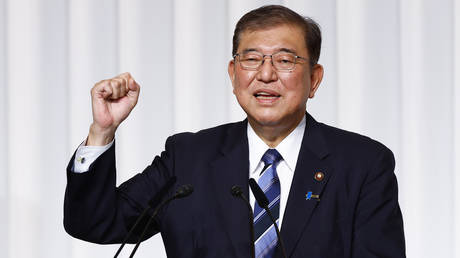Ishiba Wins Another Term as Japan's Prime Minister
Shigeru Ishiba has secured re-election as Japan's Prime Minister, despite his coalition experiencing its most significant electoral defeat in over ten years.. source:TROIB RTS

Japan’s parliament re-elected Prime Minister Shigeru Ishiba on Monday after his ruling coalition experienced its most significant setback in a lower house snap election held last month, resulting in the loss of their parliamentary majority.
At 67, Ishiba succeeded Fumio Kishida, who resigned in September amid a series of scandals that eroded public trust in the Liberal Democratic Party. Shortly after assuming office in October, Ishiba called for a snap election in an attempt to solidify his mandate. Instead of gaining support, he confronted a major defeat, as voters expressed their dissatisfaction over rising inflation and a slush fund scandal, contributing to the ruling bloc's worst performance since 2009.
In the election, Ishiba’s LDP and coalition partner Komeito lost their long-standing majority in the 465-seat Lower House. The LDP saw its seats decrease from 247 to 191, while Komeito lost eight seats, resulting in a total of 24.
In what was the first parliamentary runoff vote in 30 years, Ishiba secured his position by defeating Democratic Party leader Yoshihiko Noda with a vote count of 221-160.
As he steps into the role of leading a minority government with a bolstered opposition, Ishiba has reappointed most of his former cabinet members and emphasized that his primary objective is to “make sure that Japan is a peaceful nation and people's livelihoods improve.”
The LDP has faced scrutiny due to political scandals in recent years, including its associations with the controversial Unification Church and allegations that party officials misappropriated millions in donations.
Under Ishiba’s leadership, the LDP has distanced itself from candidates embroiled in scandals by refusing to endorse them. However, scrutiny increased after claims that the party continued to provide financial support to these candidates' regional branches.
Described by Japanese media as a “lone wolf” politician with a “stubborn streak,” Ishiba has garnered both high-level adversaries and grassroots supporters. He has also advocated for Japan to take the lead in creating an Asian version of NATO to address possible threats from China and North Korea, reflecting Japan's strategic importance as a key US ally in the region.
Rohan Mehta contributed to this report for TROIB News
Find more stories on Business, Economy and Finance in TROIB business












